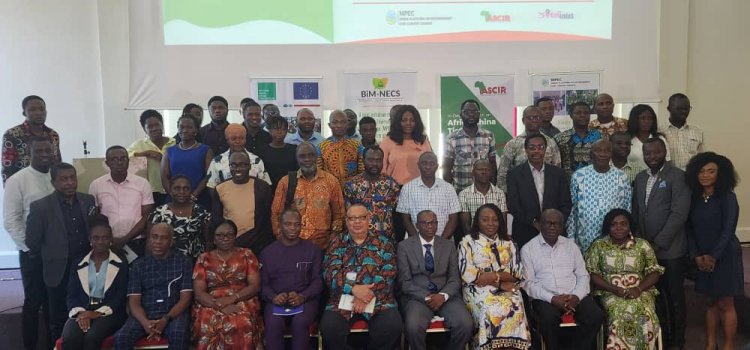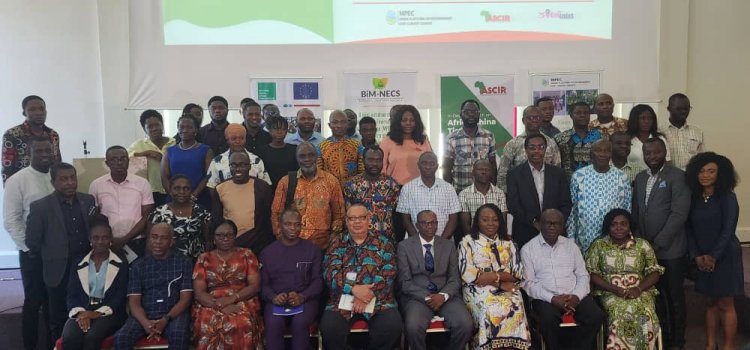Ghanaian media practitioners reporting on environmental impact issues have been urged to desist from sensationalising environmental impact stories but focus directly on providing the actual facts or information to draw the attention of the policy makers and state environmental regulatory institutions in the country.
The journalists were also called to intensify public education on the major current environmental affecting issues which included climate change, pollution, environmental degradation, and resource depletion.
"Reporting on the issues of the environmental impact is not a race and that the journalists must take their times to get the real and hard facts before making conclusion to write their stories," the Regional Page Editor of Graphic Communications Group Limited, who doubles as the member of Ghana Watsan Journalists Network (GWJN), Mr. Edmund Smith-Asante and General Secretary of Ghana Journalists Association (GJA), Mr. Kofi Yeboah have separately made the foregoing call to the journalists.
The two senior journalists were speaking during the panel discussions.at the Maiden Biennial Forum on Natural Resources, Environment, Climate Change and Science (BIM-NECS FORUM) held in Accra on Monday June 12, 2023.
The forum which was held under the theme; "Strengthening Media Focus On Natural Resources, Environment, Climate And Science: Challenges, Prospect And Way forward," brought together journalists from prints, online outlets, radios and televisions media houses in Accra.
Otganiseed by the Media Platform On Environment And Climate Change (MPEC), Afro-Sino Centre of International Relations (ASCIR), the forum served as a platform to train select journalists on natural resources, environment, climate and science and urged the journalists to report more on climate change and environmental impact issues to increase awareness to facilitate climate actions.
The journalists were encouraged to monitor the implementation of climate change and environmental impact related Sustainable Development Goals (SDGs) issues in the country.
They have also been urged to protect the privacy and dignity of individuals they report on to avoid victimising them.
Mr. Smith-Asante, who gave the advice added that journalists had the responsibility to report accurate, reliable and unbiased information ensuring that their sources were credible and information was fact-checked.
According to him, journalists had the obligation to be truthful in their reportage, recognising the current human impact of environmental issues.
“Journalists should strive to balance the interests of the public with the interests of individuals they report on,” the environmental awards winning journalist further stressed.
He emphasized the urgent need for the journalism training institutions in the country to ensure introduction of a sustainable course in the environmental reporting in their educational curriculum.
This course, according to Mr. Smith-Asante, would help the interesting training journalists to specialize in the environmental journalism before completing their journalistic training programme.
For his part, Mr. Kofi Yeboah stressed that it is a high time for owners of media houses to have environmental issues reporting desk, saying that this would be a surest way to improve environmental journalism in the country.
"Our media organisations should to be endeavoured to sponsor environmental journalists working with their media institutions to go to the field to get the real facts on the environmental impact issues," Mr Yeboah stressed.
The Editor of Amansan Television, Kukua Snead-Micheals who is also one of the panelists shared her experienced on the reportage of the environmental impact issues, and commended the Daily Graphics for leading environmental issues reporting in the country.
According to her, the country was experiencing seemingly low reportage on the environmental affecting issues because of the inability of the institutions to lent suppor to the various environmental journalists to do their works.
The Amansa TV Editor complained bitterly about lack of the proper award schemes for the die-hard environmental journalists who are interesting of reporting on environmental issues.
The lack of the motivation in the area of environmental reporting, she stressed is one of the contributory factors which caused it for more media practitioners not to focus more attention in the environmental journalism in Ghana.



 Freeman Koryekpor
Freeman Koryekpor 


































